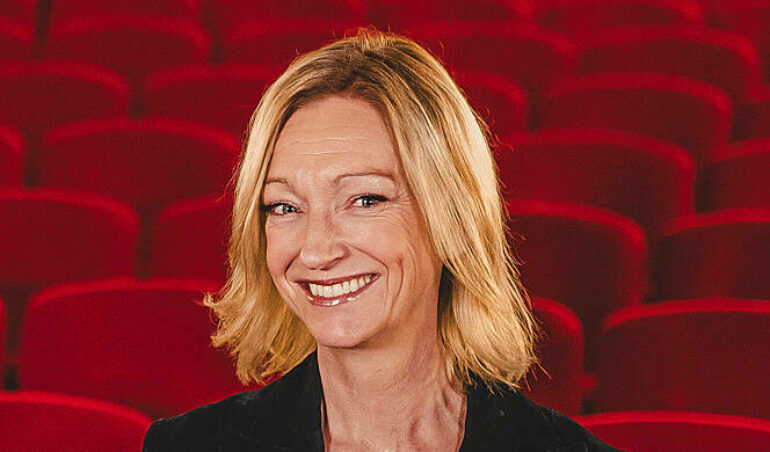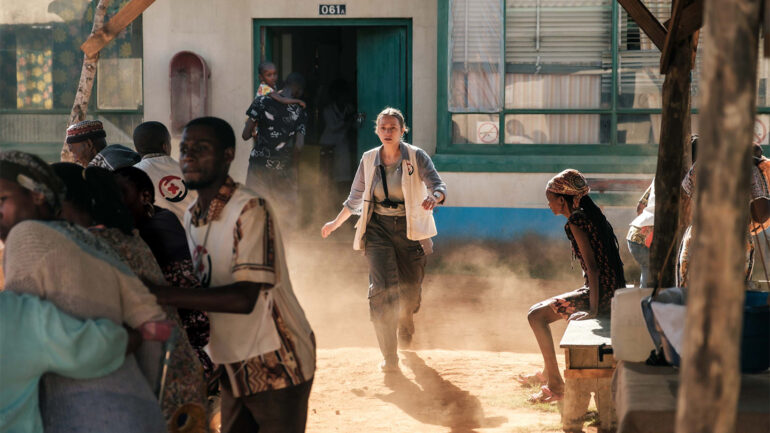WRITTEN BY: Jan Lumholdt
A well-travelled profile on the Nordic scene, Pia Lundberg now enters a new career chapter, and has just presented the programme for the 48th edition of the Göteborg Film Festival.
The early 2000s saw her by-line on the pages of Screen International and Variety as Nordic correspondent. In 2007, she became head of the international department at the Swedish Film Institute, SFI. In 2018, she installed herself as counsellor for cultural affairs at the Swedish Embassy in London. Safe to say, Pia Lundberg has spent the last quarter of a century honing her crafts and increasingly becoming a prolific, well-travelled and well-known profile on the Nordic and international culture scene.
Well-liked too, it should be added; her name has been dropped by many an industry representative as a most commendable SFI CEO, and at one point even a worthy candidate for the post of Minister of Culture. To such flatteries, her recurring reply has been that there are surely other candidates much better equipped. Her own passions lie in the field of creativity, specifically where cinema is being experienced and discussed, preferably hands-on.
How fittingly then, that Pia Lundberg, nearing the completion of her five-year London tenure, happened to take note when the Göteborg Film Festival, whose Artistic Director Jonas Holmberg was about to move on to new undertakings, was looking for a successor. A new chapter was about to begin.
“I was aware of the vacancy already in London, and several acquaintances had actually sent me the application ad, including, a little later, the festival’s CEO Mirja Wester, very kindly. To put words into my immediate reactions, they were ‘joyful’ and ‘fun’; the idea of being involved in this well-established festival with its strong Nordic focus, its lively industry platform and its loyal and sizeable audience attendance. The application process, which was indeed rigorous, only confirmed how seriously they devise, develop and define their concept. It’s a very solid organisation.”
The news of her new engagement was announced in November 2023, again to warm response. With the 2024 edition still being overseen by Holmberg, Lundberg was in the meantime given a “soft” installation. “I was told to attend as many screenings and events as possible during the 2024 festival, to observe and take in the character and the procedures, in order to be as best prepared as possible for the task and the operation when we would start to plan the 2025 edition.”
This role of “glorified trainee” gave her some revelations, not least regarding the audience part of the festival. “During my years at the SFI, I always attended the Nordic Film Market events, but due to a wall-to-wall schedule I hardly ever even once could make it to the “regular” festival. Now, I was really able to make up for lost time; I watched loads of films, listened to Q&A sessions and panel talks, and had many good encounters along the way. Great fun, and very invigorating.”
A little less than a year later, Pia Lundberg has just presented her first programme as artistic director at the 48th edition of the Göteborg Film Festival. 270 titles from 83 countries are presented across a dozen sections, among them the Voyage section for world cinema discoveries, the Visionaries and Masters sections with the latest auteur output, the Gala section with favourite Oscar contenders of 2025, and the honorary sections with elaborate retrospectives, this year devoted to the artistries of Julie Delpy, Thomas Vinterberg and Mai Zetterling (the first two also in attendance).
Among the festival’s flagships are the competition sections, including the special Nordic competitions for both fiction and documentary features and the Ingmar Bergman Competition for first-feature filmmakers. The strong focus on Nordic cinema is a, if not the, most unique selling point at what is generally considered the leading major Nordic film festival, generally cherished as such in the whole region.
“All of the Nordic film institutes as well as the production companies are very forthcoming and amicable when it comes to submitting quality titles. They get in touch early on with suggestions, regularly approaching us for their world premieres. So yes, my impression is that the Göteborg arena is especially attractive when it comes to launching the latest Nordic works. It could just as well have been, say, a Norwegian or Danish festival, but by all measures, Göteborg stands out as the foremost venue. My own assessment on why this is the case is that the Nordic focus goes back to the very beginnings here, they made it a top priority early on. They’ve created an industry platform, which works incredibly well. I feel I’m not out of line in calling it world renowned when it comes to all things Nordic within motion pictures.”
25 world premieres can be found in this year’s edition, starting out with the official opening film, the Norwegian Safe House (Før mørket), directed by Eirik Svensson. Svensson’s film, set during the Central African Republic’s civil war in 2013, is one of the nine titles in the Nordic Competition.
World premiering here are also Fanny Ovesen’s Live a Little (Leva lite), a story of two female friends couchsurfing through Europe, and Maria Eriksson-Hecht’s coming-of-age tale Kevlar Soul (Kevlarsjäl), both of them first features by Swedish directors. From Denmark, there’s the queer love story Sauna by Mathias Broe, Sylvia Le Faunu’s debut feature My Eternal Summer (Min evige sommer), again with a coming-of-age theme, and Magnus von Horn’s Cannes-competing The Girl with the Needle (Pigen med nålen). Norway is additionally represented by Dag Johan Haugerud’s Venice-playing relation study Love (Kjærlighet), Finland by Orenda, an existential drama by Pirjo Honkasalo, and Iceland with another Cannes entry, the compassionate story of young love and grief When the Light Breaks (Ljósbrot) by Rúnar Rúnarsson.
Other world premiere highlights include Norwegian Trond Kvig Andreassen’s Kyiv Soloists, Swedes Ragnhild Ekner’s Ultras and Susanna Edwards’ The Freedom of Speech Police (Dialogpolisen), all three entered in the Nordic Documentary Competition. The non-competitive Nordic Lights section holds plenty of enticing titles, including Dane Mads Hedegaard’s Stranger (Fremmed), Sakaris Stóra’s Faroe Islands-set The Last Paradise on Earth (Seinasta paradís á jørð), Finland’s Sudden Outbursts of Emotion (Kenraaliharjoitus) by Paula Korva, and Norwegian Mariken Halle’s Heroes of Tomorrow (Morgendagens helter). Special treats include Iceland veteran Baltasar Kormákur’s new outing Touch (Snerting), Tomas Alfredson’s series adaptation of the Ingmar Bergman-scripted Faithless (Trolösa), and not least Once Upon a Time, There Was a Now (Det var en gång ett nu), a currently if not finally definitive version of an ongoing creation, courtesy of the legendary Swedish auteur master Jan Troell, turning 94 this year and still distinctively creative.
While not singling out any particular favourite from the Nordic selections, Pia Lundberg immediately identifies the territories that excite her the most at the moment. “The balance will shift from time to time, I’ve noticed through the years, but Norway and Denmark are, without a doubt, very strong right now. They have a rich and varied production with a high quality all across the different genres. We’ve seen an impressive output from these countries, and it’s quite clear that both of them enjoy very good health these days.”
At the heart of the festival is a special spotlight theme, and Pia Lundberg has certainly put hers into this year’s Göteborg focus, named, after some consideration, “Disobedience”.
“I like that word, which also in this case harbours measurements of courage and resistance, something that regularly occurs in this day and age of various crises concerning democracy, climate issues, conflicts, wars and extremist movements. We depict this theme from different aspects, of course from a positive and hopeful angle, but we also question some destructive elements, and have tried to dive deep into things.”
A selection of 20 titles told in both fiction and documentary form makes up this focus section, dealing with the Israel-Palestine conflict in No Other Land, where a journalist and an activist from opposing sides form an unlikely alliance, documenting the Swedish journalist Patrik Hermansson’s year-long infiltration into the American alt-right movement in Undercover: Exposing the Far Right, depicting the uprising of farmers in India’s Punjab province in Farming the Revolution, and showing various aspects of female emancipation in the Georgian April, the Moroccan Everybody Loves Touda, and not least the Iranian Cannes sensation The Seed of the Sacred Fig (Dâne-ye anjîr-e ma’âbed), whose director Mohammad Rasoulof will be a highly special guest at the festival. In this connection, there will also be panel discussions and Q&A sessions.
It all fits into the big picture of Pia Lundberg’s vision, being part of a cultural movement, aesthetically as well as politically. “It is my belief that a film festival can have an influence, and that culture is of the utmost importance in a well-functioning and democratic society. And here I am, artistically directing and co-creating what has become the leading Nordic film festival, a great and even beautiful honour, and a task not taken lightly. I see it as a mission, to bring about food for thought, to provide new perspectives and outlooks. I believe in culture and its abilities to move mountains. I may or may not succeed, but I often think back to my years as a cultural civil servant, where I’ve seen and experienced some proof of what can be done. And film and cinema is a very accessible voice of immense importance, in our society.”

